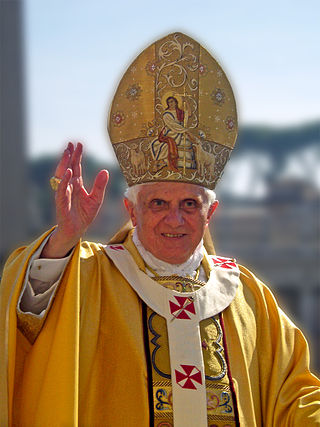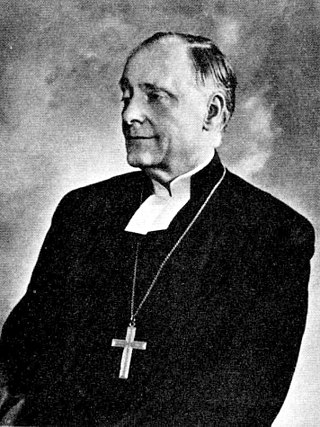Related Research Articles
Love encompasses a range of strong and positive emotional and mental states, from the most sublime virtue or good habit, the deepest interpersonal affection, to the simplest pleasure. An example of this range of meanings is that the love of a mother differs from the love of a spouse, which differs from the love for food. Most commonly, love refers to a feeling of strong attraction and emotional attachment.
In Christianity, agape is "the highest form of love, charity" and "the love of God for man and of man for God". This is in contrast to philia, brotherly love, or philautia, self-love, as it embraces a profound sacrificial love that transcends and persists regardless of circumstance.

In Christian theology, charity is considered one of the seven virtues and was understood by Thomas Aquinas as "the friendship of man for God", which "unites us to God". He holds it as "the most excellent of the virtues". Aquinas further holds that "the habit of charity extends not only to the love of God, but also to the love of our neighbor".

Karl Rahner was a German Jesuit priest and theologian who, alongside Henri de Lubac, Hans Urs von Balthasar, and Yves Congar, is considered to be one of the most influential Catholic theologians of the 20th century. He was the brother of Hugo Rahner, also a Jesuit scholar.

Ancient Greek philosophy differentiates main conceptual forms and distinct words for the Modern English word love: agápē, érōs, philía, philautía, storgē, and xenía.

Eros is a concept in ancient Greek philosophy referring to sensual or passionate love, from which the term erotic is derived. Eros has also been used in philosophy and psychology in a much wider sense, almost as an equivalent to "life energy". The Protestant philosopher C. S. Lewis posits it as one of the four ancient Greek words for love in Christianity, alongside storge, philia, and agape.

Gustaf Emanuel Hildebrand Aulén was the Bishop of Strängnäs in the Church of Sweden, a Lutheran theologian, and the author of Christus Victor, a work which still exerts considerable influence on contemporary theological thinking on the atonement.

Deus caritas est, subtitled De Christiano Amore, is a 2005 encyclical, the first written by Pope Benedict XVI, in large part derived from writings by his late predecessor, Pope John Paul II. Its subject is love, as seen from a Christian perspective, and God's place within all love. Charity is one of the three theological virtues; and the other two were treated in two successive encyclicals, one signed by Benedict and one written substantially by him but signed by his successor Pope Francis . This text begins with a reflection on the forms of love known in Greek philosophy—eros, agape, philia (friendship)—and their relationship with the teachings of Jesus.

Anders Theodor Samuel Nygren was a Swedish Lutheran theologian. He was professor of systematic theology at Lund University from 1924 and was elected Bishop of Lund in 1948. He is best known for his two-volume work Agape and Eros.

Interior life is a life which seeks God in everything, a life of prayer and the practice of living in the presence of God. It connotes intimate, friendly conversation with Him, and a determined focus on internal prayer versus external actions, while these latter are transformed into means of prayer.
Agape is commonly used by Christians to describe God's love, defining it as unconditional love.
Graham Stuart Tomlin is a British theologian, author and Church of England bishop. Since 2022, he has led the Centre for Cultural Witness; he served as Bishop of Kensington, an area bishop in the Diocese of London from 2015 until 2022. From 2007 until 2015, he was dean then principal of St Mellitus College and is now its president.

Some Christian denominations place the origin of the Eucharist in the Last Supper of Jesus with his disciples, at which he is believed to have taken bread and given it to his disciples, telling them to eat of it, because it was his body, and to have taken a cup and given it to his disciples, telling them to drink of it because it was the cup of the covenant in his blood.
The theology on the body is a broad term for Catholic teachings on the human body.
Arthur Gabriel Hebert (1886–1963) was an English monk of Kelham, Nottinghamshire, and a proponent within Anglicanism of the ideas of the Liturgical Movement.
Philosophy of love is the field of social philosophy and ethics that attempts to describe the nature of love.
Lynn de Silva's theology began at an early stage in Lynn de Silva's ministry, when his interest in Buddhism and its culture began to increase. He believed that the credibility of Christianity depended on its ability to relate to Buddhism, which was the faith of the majority of the Sri Lankan population. His objective was to develop a richer appreciation of the similarities between Buddhism and Christianity, in particular, to communicate the Christian message in a manner that the Sri Lankan culture understood, and to construct a theology that is focused towards the Buddhist cultural environment. To this end, he used Buddhist concepts to communicate Christian beliefs in a language understood from the Buddhist context, and he aimed at extending Christian theology with Buddhist concepts in order to gain a more thorough understanding of Christianity. In his book The Problem of the Self in Buddhism and Christianity, de Silva states the following:
There is a growing body of opinion within Christianity that its theology is shop-soiled and needs drastic revision in order first, to re-root it in the basic biblical teaching, secondly, to bring it into harmony with new insights and modes of thought coming from other faiths, ideologies and modern science and thirdly, to relate it to social realities... What I have attempted is to help this process of transformation in Christian thinking. However, theological thinking in order to be meaningful and relevant must be contextual. The context of this book is Buddhism.

Pierre Rousselot was a French Jesuit and author of the controversial Les yeux de la foi. He was also a great influence upon Henri de Lubac.

Werner Günter Adolf Jeanrond was Professor of Systematic Theology with special responsibility for Dogmatics at the University of Oslo. He is retired.
Edward Collins Vacek, SJ is a Jesuit priest and academic who teaches Catholic Studies at Loyola University New Orleans.
References
- ↑ Werner Jeanrond, A Theology of Love, (T&T Clark, 2010), p. 115.
- ↑ Alan Vincelette, ‘Introduction’, in Pierre Rousselot, The Problem of Love in the Middle Ages: A Historical Contribution, translated and with an introduction by Alan Vincelette (Marquette University Press, 1998), p. 11.
- ↑ Alan Vincelette, ‘Introduction’, in Pierre Rousselot, The Problem of Love in the Middle Ages: A Historical Contribution, translated and with an introduction by Alan Vincelette (Marquette University Press, 1998), p11.
- ↑ Alan Vincelette, ‘Introduction’, in Pierre Rousselot, The Problem of Love in the Middle Ages: A Historical Contribution, translated and with an introduction by Alan Vincelette (Marquette University Press, 1998), p. 11.
- ↑ Martin Luther King, "Love Your Enemies" (sermon), in Strength to Love (1963), p. 37.
- ↑ Werner Jeanrond, A Theology of Love, (T&T Clark, 2010), p. 135 ff.